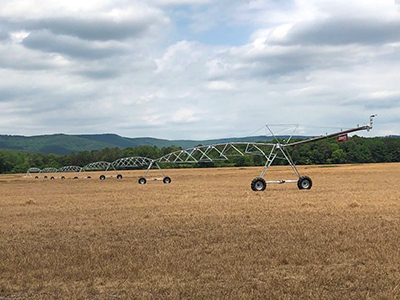Alabama Irrigation Initiative Funds Flowing In North Alabama

By Debra Davis
MONTGOMERY, Ala., June 30 — Water and funds have started flowing for north Alabama farmers approved for financial assistance through the Soil and Water Conservation Committee’s (SWCC) Alabama Irrigation Initiative.
The first payment for new, water- and energy-efficient irrigation systems was made this month to F&W Farms in New Hope. The Madison County row crop operation owned by Jeff Webster and Mike Frazier is among 45 farms currently approved for the program, which will invest a total of $8 million to increase on-farm irrigation.
SWCC Executive Director Dr. Bill Puckett said the first payment marks the culmination of years of work by farmers, SWCC personnel, university researchers, the U.S. Department of Agriculture’s (USDA) Natural Resources Conservation Service (NRCS), elected officials, the Alabama Farmers Federation and other stakeholders.
“A watershed plan for the middle Tennessee River watershed was written by Auburn University (AU) and the University of Alabama in Huntsville. It determined increasing irrigation in the watershed would not produce significant environmental impact,” Puckett said. “A Finding of No Significant Impact (FONSI) was issued in the fall of 2019, clearing the way for cost-share assistance under the USDA-NRCS PL-566 program. We look forward to delivering more payments in the coming weeks and months.”
An on-farm environmental review was conducted for each applicant. To ensure sustainability, farmers with approved projects are provided a three-year irrigation water management subscription and associated equipment, including telemetry, soil moisture probe, flow meter and weather station. A professional irrigation specialist will provide advice on irrigation scheduling through a computer app. The service is valued at up to $10,000. Cost-share assistance is capped at $200,000 per application.
The decision to support subscription services for farmers was a direct result of research conducted by AU’s Dr. Brenda Ortiz on precision agriculture and variable-rate irrigation. SWCC supported the research, which was funded by the Federation’s affiliated cotton; soybean; and wheat and feed grain producer checkoff programs.
The Federation’s Mitt Walker thanked SWCC for its sponsorship of the Alabama Irrigation Initiative and U.S. Rep. Robert Aderholt, R-Haleyville, for helping secure the needed funds.
“Irrigation is among the most effective risk management tools at a farmer’s disposal,” said Walker, the organization’s Governmental & Agricultural Programs Department assistant director. “Access to reliable water at critical times during the growing season can mean the difference between a good harvest and a total loss. We appreciate Congressman Aderholt’s support for increasing on-farm irrigation and the commitment of the SWCC to helping farmers implement efficient, sustainable systems.”
Aderholt, who serves on the powerful House Committee on Appropriations, emphasized the importance of agriculture and rural communities when announcing the initial funding.
“The funding will help local farmers better weather severe droughts,” Aderholt said. “Federal funding, such as this, is a proven example of how partnerships between federal, state and local governments benefits communities. This is exactly the type of partnerships we should be forming to best use the taxpayers’ dollars. Investing in our agriculture and conservation communities will pay dividends for decades to come, and I look forward to seeing the benefits of this partnership between the government and our state’s farmers.”
A second signup in the middle Tennessee River watershed will begin in September. The eligible area includes part or all of Lauderdale, Limestone, Lawrence, Morgan, Madison, Marshall, Jackson and Cullman counties. A watershed management plan for the Choc-Pea Rivers Watershed is under internal review. Implementation of the Alabama Irrigation Initiative in that watershed is expected to begin in early 2021.
